
Edward Hopper Railroad crossing 1923

First Debt Rattle in a very long time without a direct virus article. Unfortunately that’s not going to last. New global cases set a new record at 119,000.

New cases past 24 hours in:
• US + 22,618
• Brazil + 26,417
• Russia + 8,572
• UK 4,938
• India + 7,466
• Peru + 5,874
• Chile + 4,654
New deaths past 24 hours in:
• US + 1,230
• Brazil + 1,294
• Mexico + 447
• UK + 446
• Peru + 3,984(?!)

Update: following today's data from hospitals, a cautious estimate of the number of UK excess deaths linked to coronavirus up to 28 May is
64,000
Of these 59,537 have happened and the rest are estimates over the past 2 weeks
64,000 would be a rate of 960 per million
ENDS pic.twitter.com/Xt2tn0qex2
— Chris Giles (@ChrisGiles_) May 28, 2020

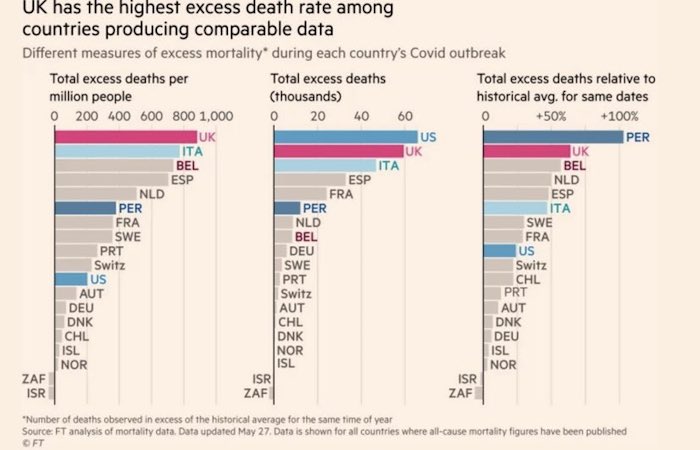



• Cases 5,932,180 (+ 118,941 from yesterday’s 5,813,239)
• Deaths 362,614 (+ 4,721 from yesterday’s 357,893)

From Worldometer yesterday evening -before their day’s close-:
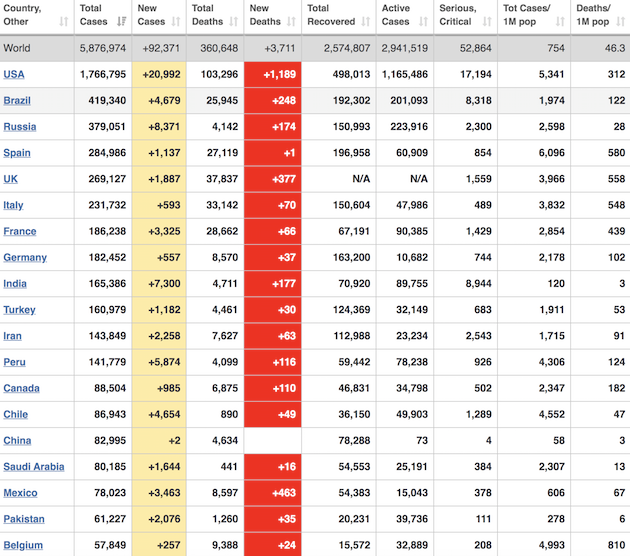
From Worldometer:
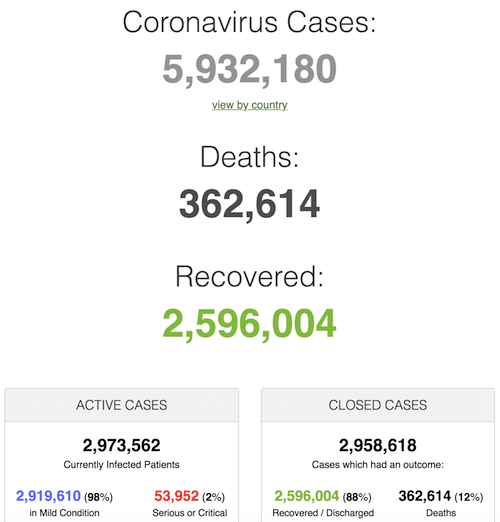
From SCMP:
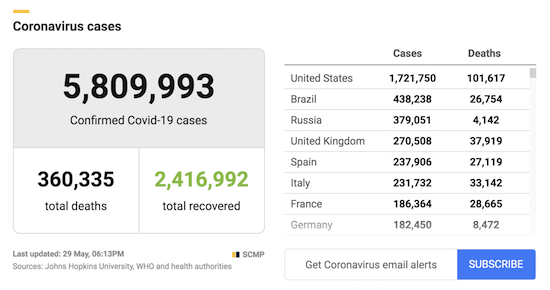
From COVID19Info.live:
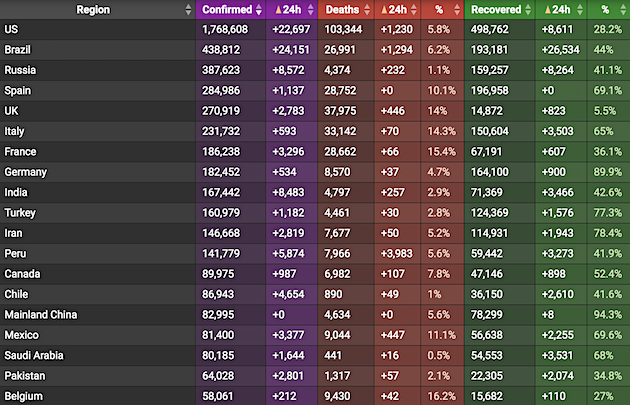

You start a piece with a headline that says everyone’s broke, and then list all the billions in extra savings. Why?
• Half of Britain Is Broke – And The Other Half Is Richer Than Ever (G.)
When was the last time you filled up the car? Bought a train ticket? Paid an air fare? Ordered a new sofa? Or even just bought a latte or booked the cinema? Days now go by when I do not spend one pence. And I know I’m far from alone. Figures emerging across Europe reveal that forced saving is happening on an unprecedented scale. French savers put aside nearly €20bn (£16.2bn) in March, compared with the monthly average before coronavirus of €3.8bn. The Italians were much the same, adding €16.8bn to savings accounts, or five times the monthly average of €3.4bn. In the UK, the Bank of England says bank deposits soared by £13.1bn in March, a record monthly rise.
Unorthodox spending patterns abound. GoCompare reckons UK drivers spent £267m less on petrol during the strictest phase of the lockdown. Retail data company Kantar says we are spending a lot more on online groceries but £1bn less on the likes of those £3 sandwich, crisps and juice lunch deals popular in Tesco Express or Sainsbury’s Local. Nationwide says four out of 10 of its customers have more disposable income than before the crisis. The better off are almost wallowing in spare cash. Even after assuming we are spending 20% more on food and alcohol, stockbroker Peel Hunt reckons upper-middle-class households in the UK (those in the ninth decile of income distribution) have cut their disposable spending by just over half.
It estimates that across the entire economy, households in 2020 will save £120.8bn, compared with £38.2bn in 2019, a gigantic increase. That’s a cool £82bn extra kicking around in savings and current accounts. [..] The stockbroking firm at least has the good grace to note we’re not all in this together. “The beneficiaries are skewed towards the top end of the income distribution. Lower-income earners are more likely to work in sectors most affected by job losses and reduced working hours. They also spend a greater proportion of their income on essentials,” it says. So what’s going to happen with all this money? These involuntary savings are entirely the product of the pandemic rather than frugality so we might expect them to go back down to normal levels when the crisis is over and pent-up demand is satisfied.

@Jack is in trouble.
• Trump Signs Order Targeting Social Media Firms’ Legal Protections (Hill)
President Trump signed an executive order Thursday aimed at increasing the ability of the government to regulate social media platforms, a marked escalation of his lengthy feud with Silicon Valley over allegations of anti-conservative bias. The brunt of the order is focused on Section 230 of the Communications Decency Act, a 1996 law that gives platforms legal immunity for content posted by third-party users while also giving them cover to make good-faith efforts to moderate their platforms. Trump’s order directs an agency within the Commerce Department to file a petition with the Federal Communications Commission (FCC) to clarify the scope of Section 230, a proposition that has already drawn rebukes from the two Democratic members of the five-person commission.
Another section of the order would encourage federal agencies to review their spending on social media advertising. Trump, joined by Attorney General William Barr, addressed reporters in the Oval Office on Thursday afternoon before signing the executive order. “We’re here today to defend free speech from one of the greatest dangers it has faced in American history, frankly, and you know what’s going on as well as anybody. It’s not good,” Trump told reporters. The president accused social media companies of having “unchecked power to censure, restrict, edit, shape, hide, alter virtually any form of communication between private citizens or large public audiences.” He also said that if he were able to shut Twitter down, he would.
Trump and Barr indicated that legislation on Section 230 could be coming soon in Congress. Barr did not provide further details, while Trump suggested they could just “remove or totally change 230.” When asked about the possibility of a legal challenge to the order, Trump said, “I guess it’s going to be challenged in court, but what isn’t?”
Twitter places public interest notice on this new tweet from President Trump.
"violates our policies regarding the glorification of violence based on the historical context of the last line, its connection to violence, and the risk it could inspire similar actions today" pic.twitter.com/Z1TuCHO1Pi
— Breaking News (@BreakingNews) May 29, 2020

The victim and the killer had worked together as bouncers in a bar for 17 years.
• Police Precinct Torched inThird Night Of Rioting In Minneapolis (R.)
Peaceful rallies gave way to a third night of arson, looting and vandalism in Minneapolis on Thursday as protesters vented their rage over the death of a black man seen on video gasping for breath while a white police officer knelt on his neck. The latest spasm of unrest in Minnesota’s largest city went largely unchecked, despite Governor Tim Walz ordering the National Guard activated to help restore order following the first two days of disturbances sparked by Monday night’s fatal arrest of George Floyd, 46. In contrast with Wednesday night, when rock-throwing demonstrators clashed repeatedly with police in riot gear, law enforcement kept a low profile around the epicenter of the unrest, outside the city’s Third Precinct police station.
Protesters massing outside the building briefly retreated under volleys of police tear gas and rubber bullets fired at them from the roof, only to reassemble and eventually attack the building head on, setting fire to the structure as police seemed to withdraw. Protesters were later observed on the roof. The city authority warned about ‘unconfirmed’ reports that gas lines to the Third Precinct police station were cut and that there were other explosives in the building. It appealed to people to retreat from the building.A car and at least two other buildings in the vicinity were also set ablaze, and looters returned for a second night to a nearby Target discount store, left boarded up and vacant from the previous night, to make off with whatever remained inside. Fire officials said 16 buildings were torched on Wednesday night.
President Donald Trump on Twitter said that he will send the National Guard troops and “get the job done right” if Mayor Jacob Frey failed to bring the city under control. “Any difficulty and we will assume control but, when the looting starts, the shooting starts,” he wrote in tweets posted late midnight.
Andrea Jenkins, vice president of Minneapolis City Council, says George Floyd and Officer Chauvin worked at restaurant near Third Precinct.
"They were coworkers for a very long time." pic.twitter.com/IrwJvmxchI
— MSNBC (@MSNBC) May 29, 2020
“If he was reprimanded when he shot me, George Floyd would still be alive” – Ira Latrell Toles
Ira was beaten and shot by the same cop who killed #GeorgeFloyd.https://t.co/AS2mBqifaS
The cop faced no repercussions then, and is being protected by the DA now.#BlackLivesMatter pic.twitter.com/AZofesAkGt
— Anti-Fascist AWK (@AWKWORDrap) May 29, 2020

Louisville, Dallas, New York.
• 7 Shot During Protests In Louisville (NBC)
Seven people were shot in Louisville, Kentucky, one of whom was in critical condition, during protests that turned violent Thursday night, police said. Circumstances of the shootings were not immediately clear, and a police spokesman called the situation downtown fluid early Friday. Officers were not involved in the shootings, Police Sgt. Lamont Washington said. No other details were immediately available from police. Mayor Greg Fischer said in a video statement early Friday that seven people were shot “from within the crowd” and no police officers fired their weapons. Five were in good condition, two were sent to surgery, he said, adding “my prayers are with all of them.”
The violence happened as hundreds had gathered to protest the death of Breonna Taylor, a 26-year-old woman who was killed by Louisville police this spring. “What we are seeing tonight in this community is the obvious frustration of the tension between police and residents,” police special adviser Jessie Halladay said earlier in a video call. “What started out as a peaceful protest earlier this evening is now escalating into property damage, more aggressive action, and we’ve just heard reports of shots fired in the crowd,” she said at the time. She said that in addition to property damage bottles had been thrown at officers.

If confused about the logic, see next article.
• Why Do Protestors Loot Shops Without Forming Private Equity Firm? (Onion)
Calling for a more measured way to express opposition to police brutality, critics slammed demonstrators Thursday for recklessly looting businesses without forming a private equity firm first. “Look, we all have the right to protest, but that doesn’t mean you can just rush in and destroy any business without gathering a group of clandestine investors to purchase it at a severely reduced price and slowly bleed it to death,” said Facebook commenter Amy Mulrain, echoing the sentiments of detractors nationwide who blasted the demonstrators for not hiring a consultant group to take stock of a struggling company’s assets before plundering.
“I understand that people are angry, but they shouldn’t just endanger businesses without even a thought to enriching themselves through leveraged buyouts and across-the-board terminations. It’s disgusting to put workers at risk by looting. You do it by chipping away at their health benefits and eventually laying them off. There’s a right way and wrong way to do this.” At press time, critics recommended that protestors hold law enforcement accountable by simply purchasing the Minneapolis police department from taxpayers.

The looters should copy Carl Icahn.
• The Hertz Story Isn’t What You Think (Ben Hunt)
On June 30, 2016, Carl Icahn led a restructuring of “Old Hertz”, where the Hertz Equipment Rental Corporation (HERC) was split off from the car rental operations (Hertz Global Holdings). Each became a separate publicly-traded company (Icahn with 39% equity stake in Hertz and a 15% stake in HERC), each installed an Icahn-controlled board (not “controlled” in a legal sense, but controlled sure enough), and each started taking on massive amounts of debt. How much debt? Well, HERC has about $2.1 billion in long-term debt, against an equity market cap of only $830 million (and that’s more than twice what it was at the March lows). The equity position is what we might call a stub … a small piece of the enterprise value of the overall corporation (debt + equity – cash). If you want to understand HERC as an equity investment, you better focus your analysis on that debt position and how the company can support that kind of leverage!
As for the debt levels at Hertz … LOL. Hertz has more than $19 billion in long-term debt, against a market cap that was (at its 2019 peak!) about $2.1 billion. Now there’s a stub for you. It’s hard for me to adequately convey the playground that an insanely levered rental company – whether it rents cars or construction equipment – provides for a financialization genius like Carl Icahn. Between asset depreciation assumptions, cost of capital assumptions, and the ability to securitize or otherwise move assets off your balance sheet … the accounting cookie jar that a rental company gives Icahn is otherworldly. Keep in mind, too, that in 2017 – more than a year after Icahn took control – Hertz was forced to report that management had “identified material weaknesses in our internal control over financial reporting.”

Well, actually, the UE has no mechanism with which to rapidly agree on this.
• EU Not In Mood To Follow Donald Trump Into China Conflict (SCMP)
European leaders are in no mood to follow the United States in threatening trade sanctions against China as it moves to tighten its grip on Hong Kong, although foreign ministers will meet on Friday to try to hack out a common position. China’s top legislature on Thursday voted to impose a national security law on Hong Kong, sparking concerns that Beijing will limit the autonomy granted by the “one country, two systems” principle that followed the end of British rule in 1997. The US, Canada, Australia and Britain condemned Beijing’s step, hailing Hong Kong as a “bastion of freedom,” while Britain held open the prospect of citizenship for more Hongkongers if Beijing presses ahead.
But despite growing tensions over the former British colony, German Chancellor Angela Merkel, Europe’s most powerful politician, insisted she still wants the European Union to reach a landmark investment agreement with China this year. And while US President Donald Trump said on Thursday the US would be announcing new US policies on Friday as “we are not happy with China” after his Secretary of State Mike Pompeo had already cast doubt on Hong Kong’s continued preferential trading status, the EU stuck to traditional diplomatic expressions of concern. EU foreign policy chief Josep Borrell said he had “deep concern” about Thursday’s move.
He has previously insisted Brussels “attaches great importance to the preservation of Hong Kong’s high degree of autonomy,” but said this week he did not think “sanctions against China are going to be a solution for our problems”. Merkel also said the EU, the world’s biggest trade bloc, needed to maintain a “critical and constructive” dialogue, with trade retaliation not on the agenda when European foreign ministers meet on Friday. “Sanctions are not on the table, our relations with the Chinese are simply too important,” one senior EU diplomat said. The senior EU diplomat added that Hong Kong could be “a game changer” as questions increase about the rule of law in a city of 7 million people that is the base for many European investors in the region.
But the key issue is whether China’s power grab in Hong Kong will weigh on the EU’s investment agreement with China. Germany wants the deal to be concluded at an EU-China summit in the German city of Leipzig in September, although the agreement was already in trouble even before the latest flare-up in Hong Kong. Michael Clauss, Germany’s ambassador to the EU and a former ambassador to China, admitted earlier this month that talks were stuck over market access rights for European companies.

Europe’s Council on Foreign Relations likes a hard line.
• Europe, China, and Hong Kong: New Red Lines Will Be Worth The Cost (EFCR)
Both international and Chinese companies have long benefitted from the framework of ‘one country, two systems’. It has allowed business to take place outside the direct access of Beijing’s tight authoritarian control of people and capital on the mainland. For decades Hong Kong has enjoyed special privileges in international trade and has thus been one of Asia’s most vibrant economic and financial hubs. Beijing’s alteration of the status quo will likely provoke a US response in the form of sanctions against China or the cancellation of Hong Kong’s special economic privileges. The attempt to turn Hong Kong into just another Chinese city will no doubt hurt Chinese businesses and elites, but it will likely hurt Western companies even more, as they have long relied on Hong Kong’s excellent business conditions as an invaluable gateway to the Chinese market.
Amid the global pandemic and rising US-China tensions, the push on Hong Kong was foreseeable, but still somewhat unexpected. The Chinese government has likely judged that now is the perfect time to complete some unfinished business. China is intensifying its patrols and creating new administrative structures in the South China Sea. It has increased sabre-rattling towards Taiwan. And Chinese military forces have reportedly entered into Indian territory along the Sino-Indian border, where stand-offs and limited skirmishes have lately occurred on a more regular basis. While the coronavirus has effectively pressed the pause button on the world economy, China’s policymakers have hit fast-forward on restoring ‘territorial integrity’ and dominance in Asia. For Europe, this comes at the worst possible moment.

If need be under grave threat.
• China Says Wants ‘Peaceful Reunification’ With Taiwan (R.)
The head of China’s Taiwan Affairs Office said on Friday that “one country, two systems” and “peaceful reunification” is the best way to bring China and Taiwan together. Outside attempts by foreign forces to interfere in “reunification” will fail, Liu Jieyi told an event at the Great Hall of the People marking 15 years since China signed into law its Anti-Secession Law. Beijing passed the law in 2005 which authorises the use of force against Taiwan if China judges it to have seceded.

Two different voices saying the same thing. Agenda much?
• Attack On Taiwan An Option To Stop Independence, Top China General (R.)
China will attack Taiwan if there is no other way of stopping it from becoming independent, one of the country’s most senior generals said on Friday, in a rhetorical escalation from China aimed at the democratic island Beijing claims as its own. Speaking at Beijing’s Great Hall of the People on the 15th anniversary of the Anti-Secession Law, Li Zuocheng, chief of the Joint Staff Department and member of the Central Military Commission, left the door open to using force. The 2005 law gives the country the legal basis for military action against Taiwan if it secedes or seems about to, making the narrow Taiwan Strait a potential military flashpoint.
“If the possibility for peaceful reunification is lost, the people’s armed forces will, with the whole nation, including the people of Taiwan, take all necessary steps to resolutely smash any separatist plots or actions,” Li said. “We do not promise to abandon the use of force, and reserve the option to take all necessary measures, to stabilise and control the situation in the Taiwan Strait,” he added. Although China has never renounced the use of force to bring Taiwan under its control, it is rare for a top, serving military officer to so explicitly make the threat in a public setting. The comments are especially striking amid international opprobrium over China passing new national security legislation for Chinese-run Hong Kong.

Five Eyes alliance. They should ban 5G until it’s been properly researched.
• Britain Seeks Alliance Of 10 Democracies To Break China’s 5G Monopoly (Sun)
Britain is seeking an international alliance to supply Brits with 5G internet and break China’s monopoly over the network. The Government is driving forward plans for 10 democratic countries to work together and find a new provider for the superfast internet. Ministers want the UK to form a club of nations, dubbed the ‘D10’, to fund technology companies and find a 5G supplier to replace Huawei. The PM approved plans for the Chinese company to build part of the UK’s new internet network in January, despite pressure from MPs and the US government. The D10 club would see G7 nations – Canada, France, Germany, Italy, Japan, the UK and the US – join forces with Australia, South Korea and India to find another company to build the 5G network.
The UK has already approached Washington with the plan, the Times has reported. A source told the newspaper: “We need new entrants to the market. That was the reason we ended up having to go along with Huawei at the time.” It comes amid rising tensions between the UK and China, with the Government accusing the Communist state of covering up coronavirus. Cabinet Secretary Michael Gove said in March that China “was not clear about the scale, the nature, the infectiousness of this disease.” Nokia and Ericsson are the only two companies in Europe that are currently supplying 5G infrastructure, but it is believed they could not build the network as quickly as Huawei.

Feels like Vito Corleone taking the Tattaglia family to court.
• US Judge Orders 15 Banks To Face Big Investors’ FX Rigging Lawsuit (R.)
A U.S. judge on Thursday said institutional investors, including BlackRock and PIMCO, can pursue much of their lawsuit accusing 15 major banks of rigging prices in the $6.6 trillion-a-day foreign exchange market. U.S. District Judge Lorna Schofield in Manhattan said the nearly 1,300 plaintiffs, including many mutual funds and exchange-traded funds, plausibly alleged that the banks conspired to rig currency benchmarks from 2003 to 2013 and profit at their expense. “This is an injury of the type the antitrust laws were intended to prevent,” Schofield wrote in a 40-page decision.
The banks, which sometimes controlled more than 90% of the market, included Bank of America, Barclays, BNP Paribas, Citigroup, Credit Suisse, Deutsche Bank, Goldman Sachs, HSBC, JPMorgan Chase, Morgan Stanley, Royal Bank of Canada, Royal Bank of Scotland, Societe Generale, Standard Chartered and UBS or various affiliates. In their complaint, the plaintiffs accused the banks of improperly sharing confidential orders and trading positions, and using chat rooms with such names as “The Cartel,” “The Mafia” and “The Bandits’ Club.” Banks were also accused of using deceptive trading tactics such as “front running,” “banging the close” and “taking out the filth.” [..] The litigation began in November 2018, after the plaintiffs “opted out” of similar nationwide litigation that had resulted in $2.31 billion of settlements with most of the banks.

Sorry to see this. Finish what you start.
• Tulsi Gabbard Drops Defamation Suit Against Hillary Clinton (NYP)
Former presidential contender Tulsi Gabbard dropped her defamation lawsuit against Hillary Clinton on Wednesday, saying the COVID-19 pandemic and 2020 presidential election are more important than her legal claims. In court papers filed in Manhattan federal court Wednesday, Gabbard wrote that, while her claims have merit, it’s better to “focus their time and attention on other priorities, including defeating Donald Trump in 2020, rather than righting the wrongs here.” Gabbard, a congresswoman from Hawaii, sued Clinton in January, claiming the former first lady defamed her by calling her a “Russian asset” during the 2020 Democratic presidential primary.
“Tulsi Gabbard is running for President of the United States, a position Clinton has long coveted, but has not been able to attain,” Gabbard’s Manhattan federal lawsuit read. “In October 2019 — whether out of personal animus, political enmity, or fear of real change within a political party Clinton and her allies have long dominated — Clinton lied about her perceived rival Tulsi Gabbard. She did so publicly, unambiguously, and with obvious malicious intent,” it added. Clinton had refused to walk back comments she made during a 2019 appearance on a podcast, in which she referred to Gabbard as a “favorite of the Russians.” “She’s the favorite of the Russians. They have a bunch of sites and bots and other ways of supporting her so far,” Clinton told “Campaign HQ” host and former Obama campaign manager David Plouffe.

Where the real danger resides.
• Adam Schiff Alarmingly Close to Handing Trump Dangerous Spying Powers (Timm)
Congress has been embroiled in debate over the potential renewal of three controversial provisions of the Patriot Act, the post-9/11 spying bill that has been harshly criticized by civil liberties advocates for almost two decades. At issue in Congress is the fact that Section 215 of the Patriot Act (the provision once secretly reinterpreted by the FISA court to authorize the NSA’s mass phone surveillance program) allows the Trump administration to gather the internet browsing and search histories of Americans without a warrant. Sen. Ron Wyden had proposed an amendment that would require federal authorities to get a probable cause warrant before ever accessing this data.
It seemed like a popular no-brainer: Web browsing and search history is some of the most sensitive content online, and internet privacy has never been a bigger concern to the public. But in a dramatic vote two weeks ago, the Senate roll call on Wyden’s amendment fell just one vote short of the 60-member threshold from passing. With two Democratic caucus members — Bernie Sanders and Patty Murray — missing the vote, the final tally was 59 for and 37 against. The outrage was swift. Even in the Covid-saturated media environment, dozens of news outlets covered the controversy, and the reaction from constituents across the country then came pouring in. Civil liberties organizations immediately mobilized their supporters to contact members of the House, which still must vote on the final bill before it goes to Trump’s desk for a signature.
The pressure worked. Later that same day, Senators voted to pass another amendment that has the potential to reform the secretive FISA court in a significant way. And the House’s privacy advocates felt emboldened to push House leadership to hold a vote on the Wyden amendment during its debate of the Patriot Act bill this week. At the behest of Speaker Nancy Pelosi, a bipartisan team of House representatives — led by Democratic Rep. Zoe Lofgren and Republican Rep. Warren Davidson — negotiated for three days with Schiff on the exact language of the amendment. Lofgren and Davidson wanted an up and down vote on Wyden’s version that failed in the Senate by one vote, but Schiff reportedly resisted. The sides reached a compromise late Tuesday afternoon.
Schiff pushed for a change to the amendment so that warrant protections would only cover “U.S. persons,” a definition that would exclude millions of undocumented immigrants in the United States, including the thousands of DACA recipients, who are at particular risk of surveillance under the Trump administration. Even with the weakened language, Wyden supported the bill, while emphasizing in a statement that the bill’s language meant that if there was any possibility of Trump collecting U.S. persons’ data, then the administration had to get a warrant.

The judge will get roasted. Nobody agrees with the move.
• Law Professionals Support DOJ Decision To Dismiss Michael Flynn Case (Hill)
More than two dozen former prosecutors, judges and active trial lawyers filed a brief backing the Department of Justice’s (DOJ) decision to dismiss the case against President Trump’s former national security adviser Michael Flynn. The bipartisan group of former government attorneys are asking U.S. District Court Judge Emmet G. Sullivan for them to formally file an amicus brief on the case. The group includes former Whitewater independent counsel Kenneth Starr and U.S. Rep. Trey Gowdy (R-S.C.). “The issue presented in this case is whether the court has discretion to deny a motion to dismiss to which the defendant consents, as Gen. Flynn has done here. The answer is no,” the attorneys wrote.
Attorney General William Barr requested that the Justice Department drop the charges against Flynn of lying to the FBI about his contacts with Russia shortly before Trump took office. The attorneys argue that Sullivan does not have the legal right to override the decision from the prosecutor — in this case the DOJ — to dismiss a case they are prosecuting. “There is simply no basis upon which this Court can review and deny the Government’s motion to dismiss, to which the defense has consented,” they wrote. Earlier this month, 16 former Watergate prosecutors also asked Sullivan for permission to weigh in on the case. The attorneys argued that given the DOJ’s decision to dismiss Flynn’s criminal prosecution — despite his 2017 guilty pleas — the department cannot be counted on to give the court a fair and complete presentation of the issues raised by the move.

History lessons are always good.
• Why Did So Many Restaurants Stay Open During the 1918 Pandemic? (Spang)
You’re living in a pandemic. Public health officials recommend new measures every few days: avoid crowds, open windows, wear a mask. Schools close, theaters go dark, even churches shut their doors. But at least the restaurants are open! The year is 1918—maybe not so much like 2020 after all. For years, centuries even, we took restaurants for granted; it is news to most people that they had to be invented (I write about this history in my book The Invention of the Restaurant). As a child, it made sense to me that Eli Whitney invented the cotton gin and Alexander Graham Bell, the telephone—as we learned in school, “progress” meant currently familiar technologies had all started at some point in the past. Jonas Salk created a polio vaccine. These people were all famous because they invented a new thing. But that social and cultural forms had a history, that not just individual eateries but the entire category of restaurants might be new at one point and non-existent at another? Go figure.
Now it appears that restaurants may not only have a start date, but an end date as well. Born of Enlightenment medical sensibility (the first restaurateurs sold restorative broths and marketed their products especially to people with “weak and delicate chests”), restaurants as we knew them just six months ago may well be a thing of the past—killed off, or at least radically altered, by the current pandemic. For more than 200 years, restaurants have been public places where people go to be private: to sit at their own tables, have their own conversations, eat their own meals. But even that limited degree of interaction violates the social distancing guidelines widely in place today.
Operating in most cases with small profit margins—this month’s customers pay next month’s rent—few restaurants can afford two weeks (much less months) of forced closure. Estimates are that 75 percent of independently owned restaurants may never re-open. Without them, bakeries, specialty farmers, and wine distributors are likely to be in serious trouble as well. While most authorities in the United States today agreed on restaurants closures as a vital public-health measure, their counterparts during the deadly 1918 influenza epidemic saw things differently. A hundred years ago, it seemed obvious that crowds would form along parade routes, in public parks, at revival or club meetings—but not in restaurants.

We try to run the Automatic Earth on people’s kind donations. Since their revenue has collapsed, ads no longer pay for all you read, and your support is now an integral part of the interaction.
Thank you.

YouTube CEO Susan Wojcicki says anything that goes against the W.H.O. is a violation of YouTube policies. All content that isn't "medically substantiated," such as advising people take Vitamin C, will be removed by the platform. pic.twitter.com/OinPge6KoZ
— Q Research Notables (@QAnonNotables) April 20, 2020

Support the Automatic Earth in virustime.








Home › Forums › Debt Rattle May 29 2020